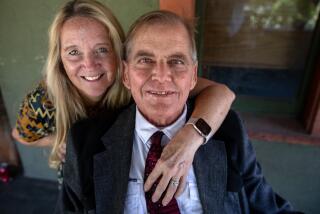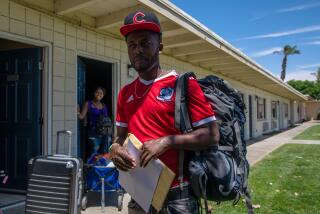Project Love Welcomes ‘the Kids Nobody Wants’--AIDS Victims and the Abused
- Share via
SAN JUAN, Puerto Rico — Marisa Blay was content keeping house as a wife and mother until she had a dream that changed her life. As a result, she became guardian of some of the youngest and most-abused victims of the AIDS epidemic.
“In my dream, I was in heaven and God told me I was going to hell because he had given me so much and I had never helped anybody in return,” she said.
The dream inspired Proyecto Amor (Project Love), Puerto Rico’s first home for newborns and toddlers infected with the AIDS virus who have been beaten, neglected or abandoned.
“I want the kids nobody wants,” Blay said.
She and her husband, Jorge, who owns a swimming pool construction company, used their savings to found a new charity. They bought an $85,000 house on a half-acre lot in the San Juan suburb of Rio Piedras. Local businesses, civic groups and individuals donated fresh paint, furniture, clothes and toys.
In July, after months of untangling red tape with public health authorities, Blay opened the home with an assistant, eight nurses and two cooks.
The house is a cheery bungalow surrounded by palms and broad-leafed tropical plants, with swings, a slide and monkey bars in the back yard. The rooms are airy and clean and the closets bulge with little dresses and shirts. New cribs are arranged in tidy rows in the three bedrooms.
“This is my bed,” 4-year-old Hilario said proudly, hurrying over to the crib where he had left his teddy bears.
Hilario, Carmen, 3, and Margarita, 11 months, were the first children brought to Proyecto Amor. (Their names were changed at Blay’s request.)
The home expects to take in 12 others, including a newborn whose drug-addict mother walked away from her in the hospital, in the coming months.
The house escaped serious damage from Hurricane Hugo, but the children were temporarily moved out when the electricity was knocked out.
Puerto Rico, with 3.3 million people, has one of the most serious AIDS epidemics in the Western world. Since 1982, 2,940 cases of AIDS have been reported, and authorities estimate that 10 times that many people may be carrying the virus.
Blay met Carmen on a visit with her church group to a shelter for battered children. At the age of 4 months, Carmen had been left home alone with her two toddler brothers for about five days.
She was undernourished and had pneumonia and a fungus infection. Blood tests were HIV-positive, showing that she is a carrier of the virus that causes acquired immune deficiency syndrome.
Police picked up Hilario as a 2-year-old wandering the streets of Old San Juan, the capital’s historic district. His mother was a chronic drug abuser and he was found to be an AIDS carrier.
He was brought to the hospital where Carmen was staying. They shared a room there for nearly two years, and now they play together around their new home, very much as brother and sister.
“They’ve been together so long, they have to be together now,” Blay said.
Baby Margarita was born to a drug addict with four other children, and she nearly died of neglect.
“She didn’t smile. She didn’t cry,” Blay said. “When they told us about her, they told us she needs a lot of caring, she needs to be held a lot. She had never been held.”
Proyecto Amor is licensed as a shelter for up to 15 children ranging in age from newborn to 7. The Puerto Rico Department of Social Services pays $2,000 a month for each child, which covers food, medicine and a $5,000 monthly staff payroll, Blay said.
The Blays, who have two young children of their own, retain title to the Proyecto Amor property and pay its taxes and utility bills, even though they do not live there. Blay said they plan to add rooms, if necessary, and do not want to give up ownership for fear that it might become too much like an institution.
“I want it to work as a home, full of love for these kids, as long as they last,” she said.
Hilario, Carmen and Margarita all appear healthy now, but medical statistics are stacked against them. Blay said she is trying to prepare herself emotionally for their deaths.
“I know that they have a sickness that will one day bring their lives to an end,” she said, “but I have faith they are going to last a long time.
“The little boy and the little girl have told me they’re going to run this house when they grow up.”
More to Read
Sign up for Essential California
The most important California stories and recommendations in your inbox every morning.
You may occasionally receive promotional content from the Los Angeles Times.













